JOZINESS
Jozi food, from early days to now and beyond
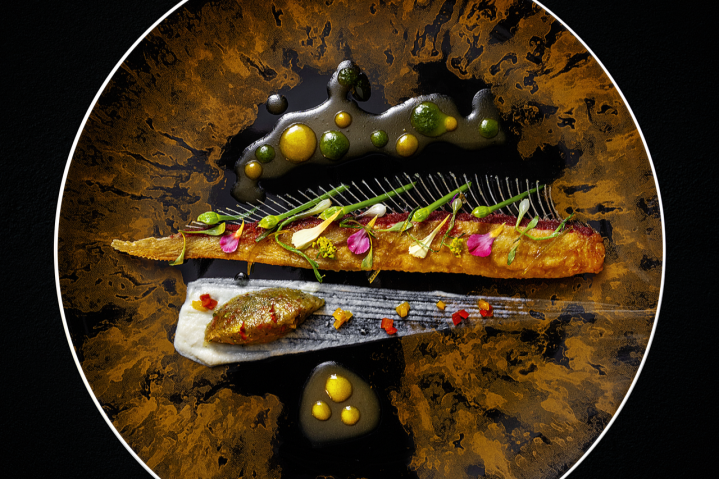
What is the essence of Joziness, from restaurants to creators? It’s what ‘Joziness’ is. It’s the answer to what Jozi food is. It’s the answer to what we’re doing next and it’s the answer to why.
Up at this end of South Africa, we say that everyone in Jozi is from everywhere else. Or at least their family came from somewhere else. It’s been that way around here since Difaqane days.
What Jozi food is
Before 1818, the Joburg-to-be area had plenty of communities eating home food, farming, herding, even smelting. Then families, households, communities and civilisation were completely destroyed.
In 1835, there was no food and certainly no cuisine to call our own. The area had been depopulated by the Difaqane. There’d been 10 years of extreme drought before Shaka and Mzilikazi unsettled and uprooted everyone who had been here before. They had fled anywhere, for their lives — conversely, any people who arrived in this area were fleeing from somewhere else.
A decade later, the first trickle of people from outside areas started moving into the region that would become Johannesburg. Some were Trekboers who had brought food with them, while others were the hungry displaced people from other parts of the country.
Today, Jozi’s food, like its many residents, stems from almost everywhere else, essentially. Then that gives rise to food inspired by those relocations. Cuisine almost always develops local aspects because of local ingredients or local demand. It’s our endlessly rich feast and it’s unique to this city. It’s our Joziness.
Visitors and tourists get that Jozi’s culinary whole is composed of its many parts. People from our own country often don’t.
The Artivist restaurant in Braamfontein comes to mind. It includes the Unnamed basement as a music venue and was long a favourite of mine for South African (e.g. mogodu and dombolo) and Mozambican (e.g. pork belly with chouriço and feijoada) dishes served fine-dining style. Now, Glory, a fresh-responsible-eastern style pop-up run by an Englishman and an Italian woman, has entered the mix, and is particularly known for its crisply fried chicken with miso butter and healthy oriental bowls. It’s all cheffily delicious, in a fab place, just hard to put the finger on one single origin.
Easier to identify, as being from the Eastern Cape, is Kobo Cuisine. Having recently relocated from Maboneng it is doing well at catering under the same moniker but is looking for premises for another fascinating dining restaurant. Multi-award-winning Chef Siyabulela Kobo in his crisp toque calls his finely plated cuisine Progressive African and follows the fresh, seasonal, authentic ingredients route with it. I’ve long been a fan, following him all the while.
There are umpteen excellent steakhouses in Jozi but Che Argentine has long been a major wow. Oscar Faraldo is really from Uruguay, his partner or che being the Argentinian, who has branched out into the Cradle of Humankind. There’s more about him later. Faraldo is not a trained chef but sure knows his beef — sizzling cuts of asada, receta and loma — and he knows how South Africans love the flame-grilled meat and juicy Argentinean accompaniments. The restaurant in Parkwood is an eccentric place of alluring, ‘ta-da!’ atmosphere.
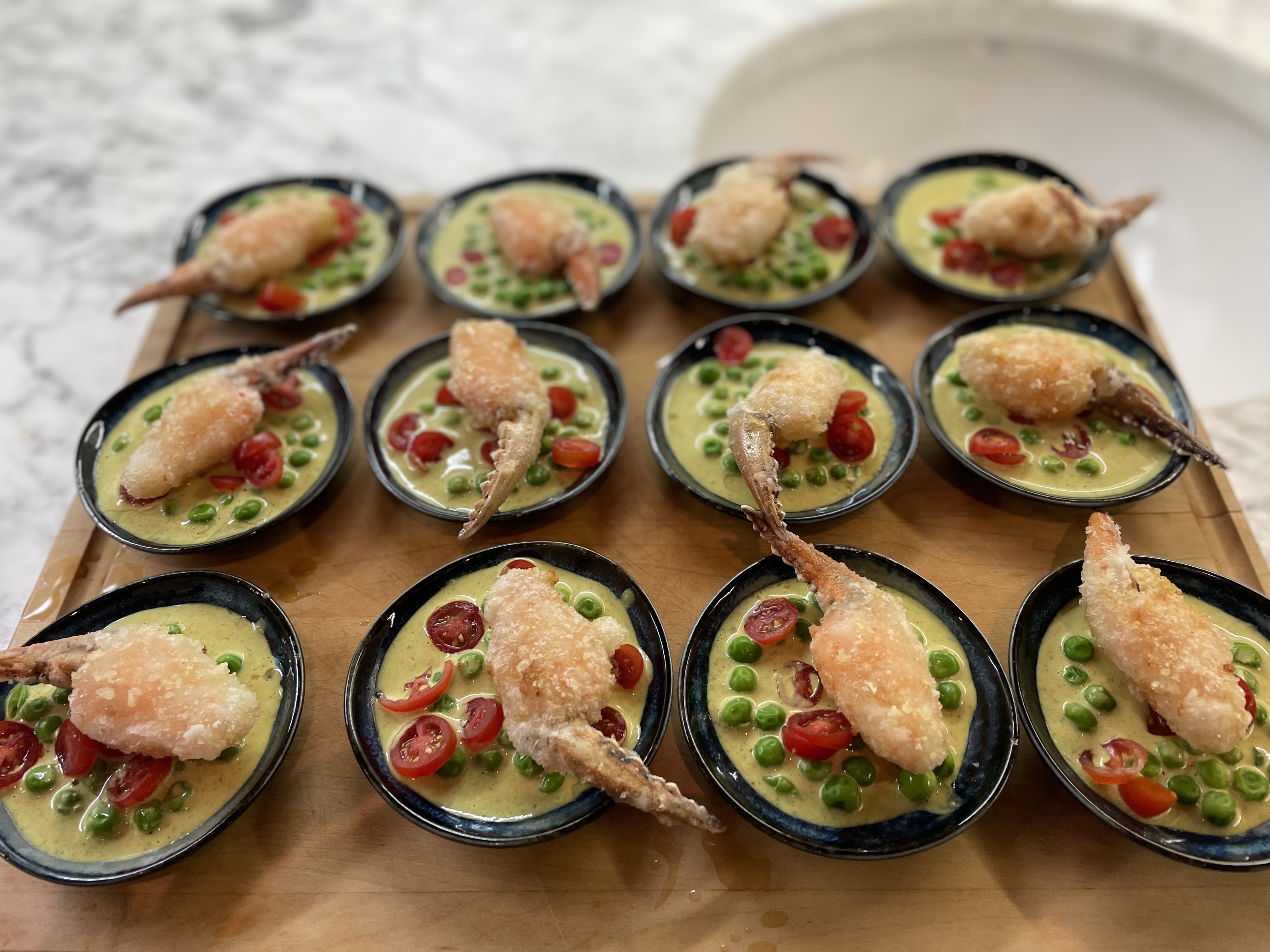
One of the many courses at Su-yen Thornhill’s weekly Chez Fong, huge-fun dinner. (Photo: Supplied)
Chez Fong isn’t even a real restaurant and you need to book long in advance to eat Su-yen Thornhill’s weekly multicourse, huge-fun dinner at her own house in Forest Town. It’s one of the very Jozi food experiences I most readily recommend. It’s Chinese inspired, her eccentric mum “possibly” being a Cordon Bleu chef, who then married a Scotsman. It’s always different, depending on the ingredients Su-yen picks out that day.
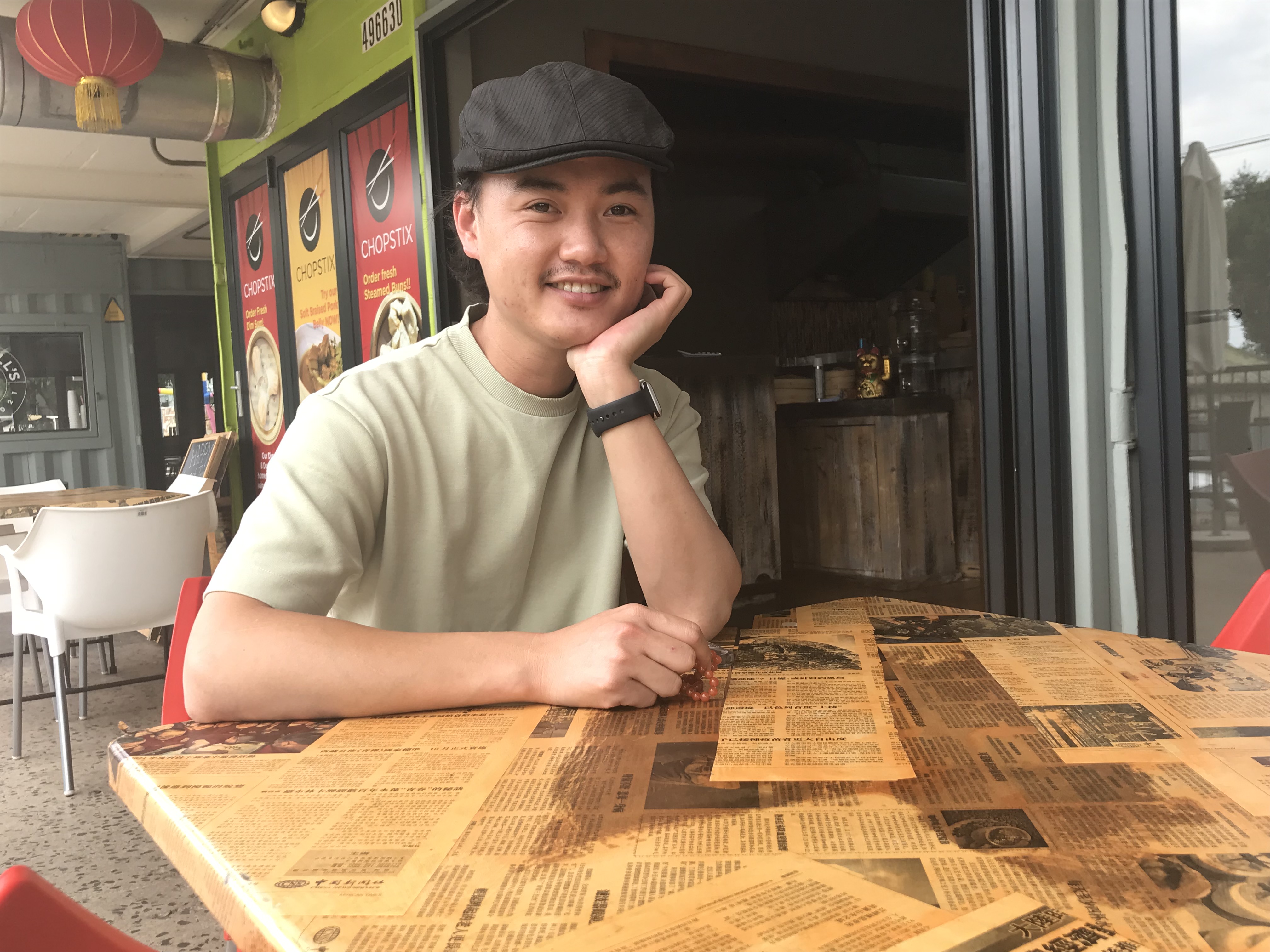
Charlie of Chopstix should get the Jozi star of relief, for taking the baffling part out of Chinese food. (Photo: Marie-Lais Emond
Charlie Chen of Chopstix in Melville is Chinese, from Fujian province. However, he decided that if he were going to live and cook and sell food in Jozi, he’d learn to speak English well. Then he’d ensure that eating his rather delicious foreign food is a pleasure and easy to access for his local clientele. For this he should get the Jozi star of relief.
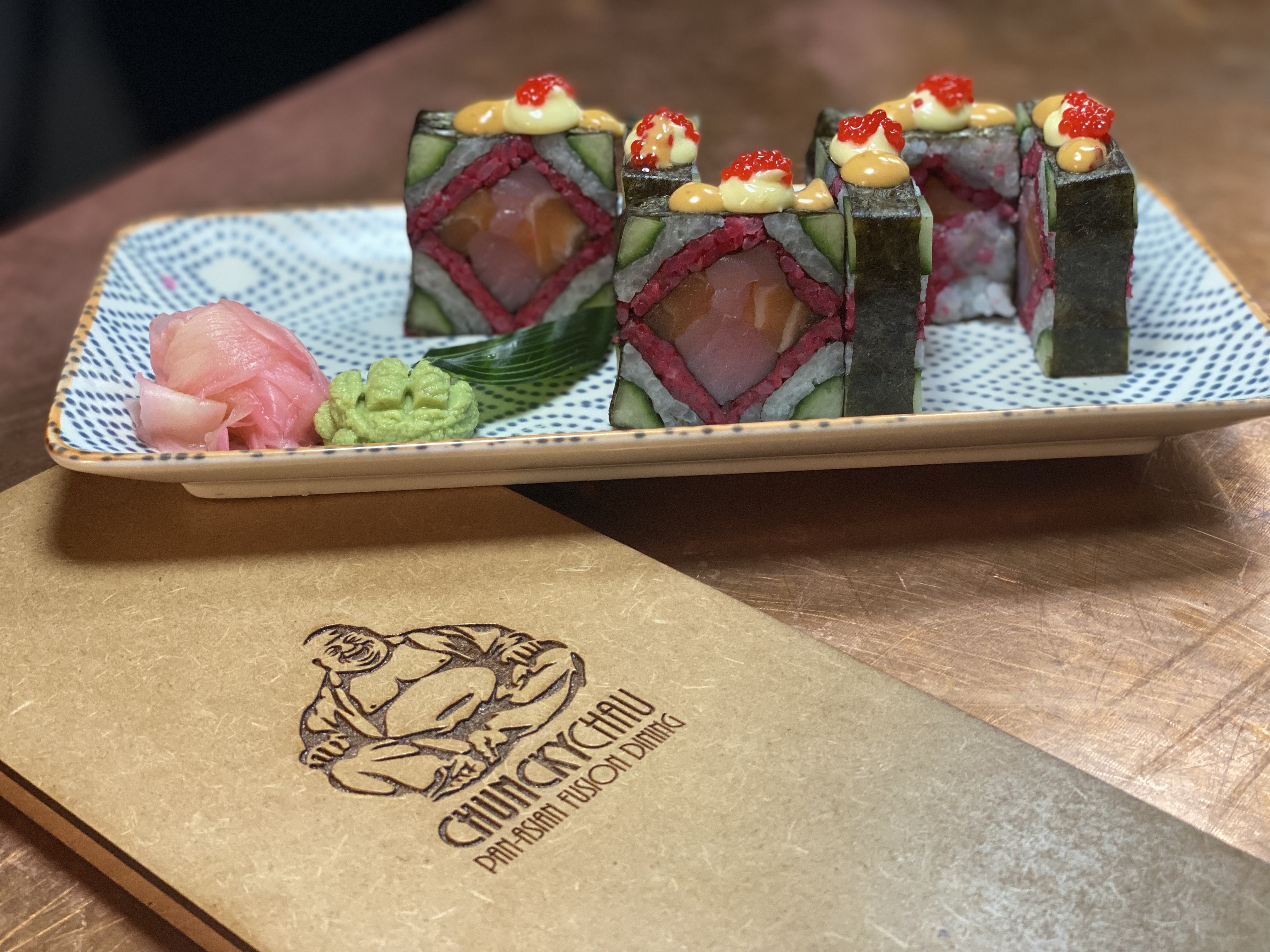
Tongue-in-panAsian-cheek fare is most impressive at Chunky Chau. (Photo: Supplied)
For Jozi foodiness, Chunky Chao in Rosebank is exemplary. Of the owner couple, Josef Schmid is German-Scandinavian and then from Hong Kong, Singapore, Bali, Manila and Surabaya before Jozi. The place is delightfully evocative and the food, while tongue-in-panAsian-cheek, is most impressive.
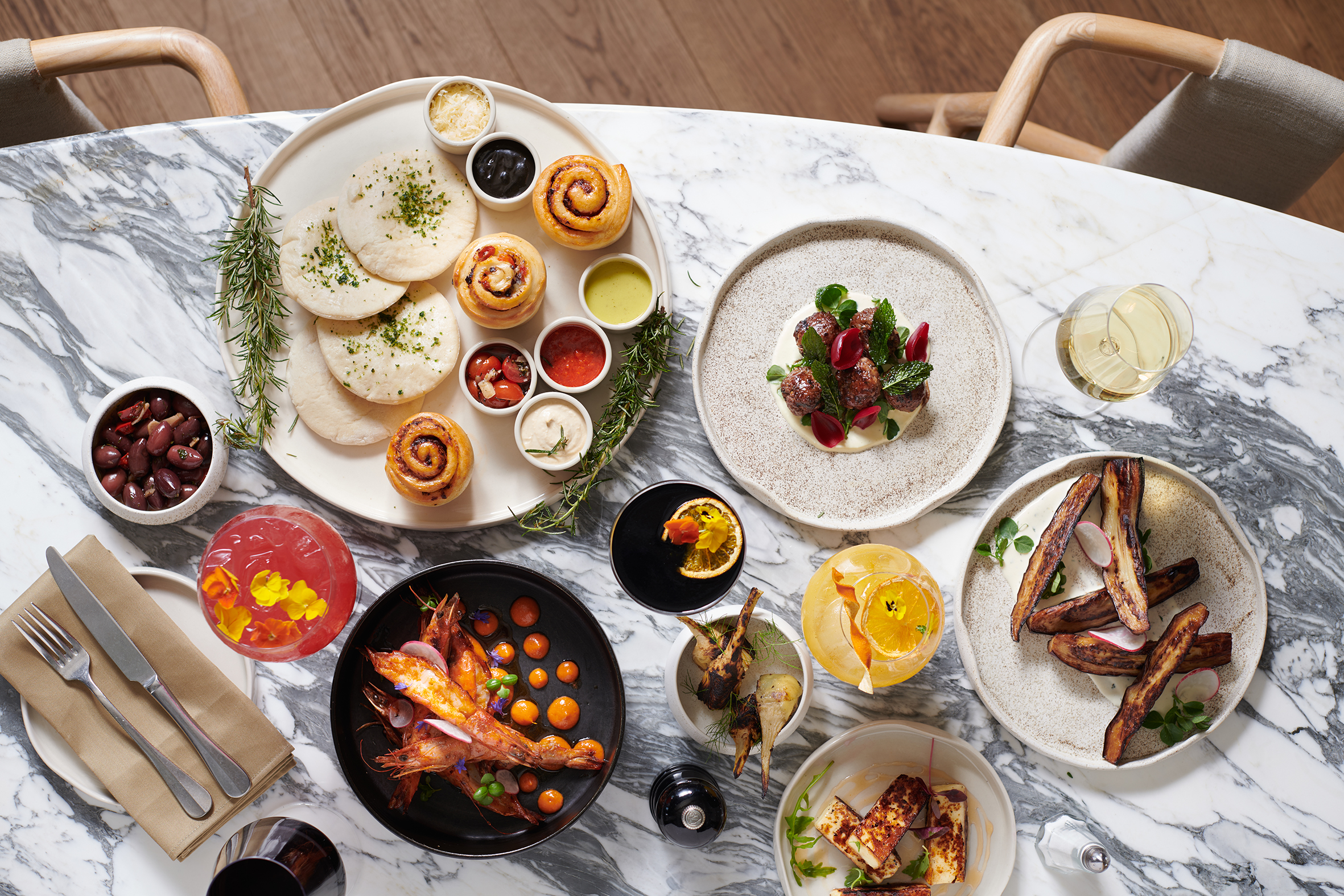
On the top taste and beauty rung is Ethos. (Photo: Supplied)
Jozi has a large Greek community with many strata of Greek food places, apart from the chains, which are more popular. On the top taste and beauty rung is Ethos, palely resplendent in the Oxford Parks development in Rosebank, with chef Mpilo Mokoena, who has replaced Phuduhudu.
Chef Freddy Dias introduced fine dining to the Houghton Hotel with his Sejour restaurant and it’s worked like a dream, winning various food awards last year. His Portuguese heritage tapas, called petisco, are standouts on his clever menu.
Of the many Portuguese people in Jozi, most originated in Madeira. More recent arrivals are Madeirans Manny and Ana Paola Barbuzano of their highly appreciated, high-standard 1920 restaurant in Hyde Park. Among Ana Paola’s fantastically popular Portuguese and Mozambican dishes are some special treasures as true to original Madeiran form as possible — like her luscious tripe and beans, dobrada and the 1920 lingua da vaca.
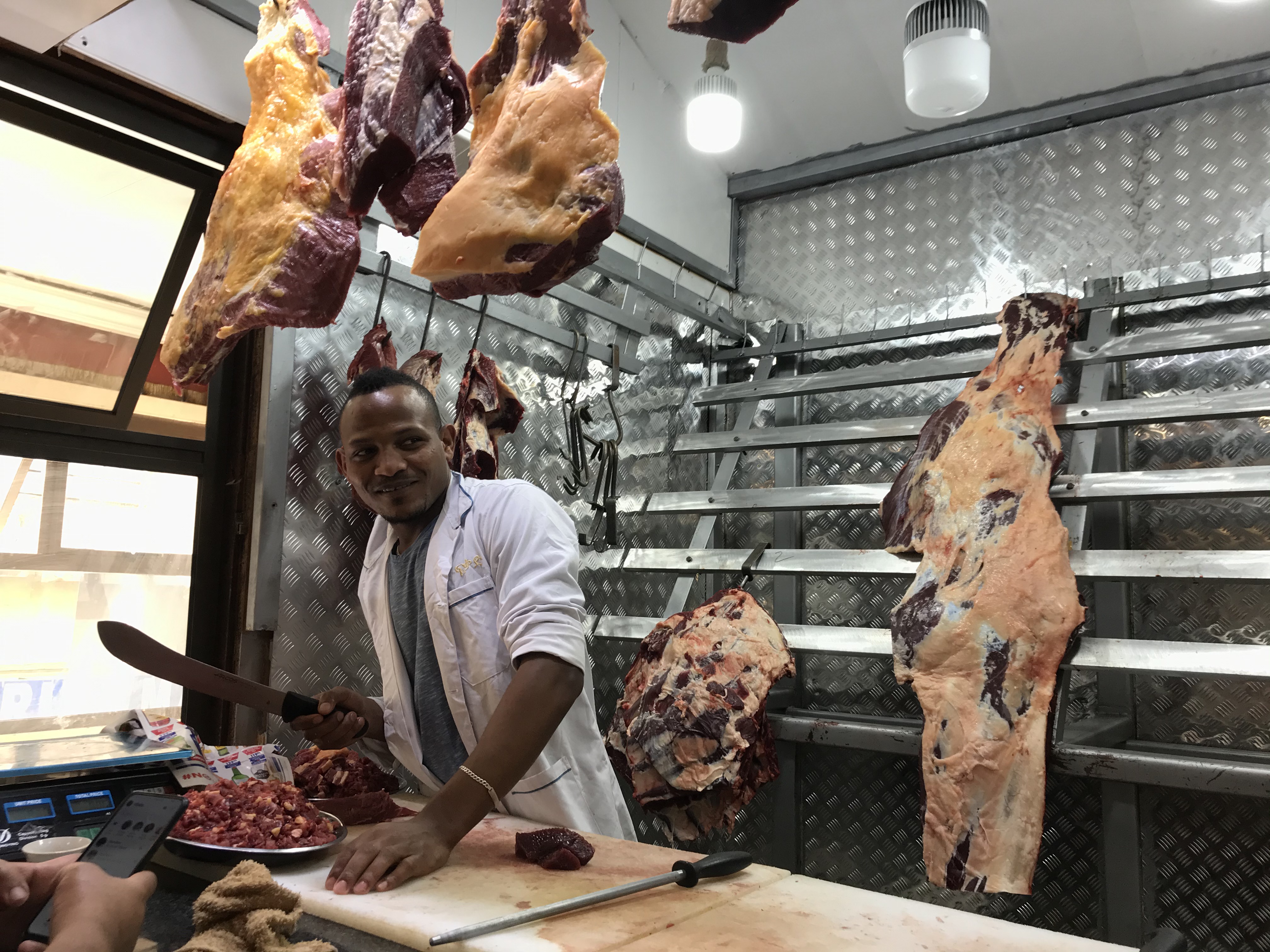
Ethiopian butcher within the Berkusafad restaurant, within ‘Majesty’. (Photo: Marie-Lais Emond)
There’s a whole section of downtown Jozi that’s known as Little Addis, owing to the many Ethiopian businesses based there. If you know, ask for ‘Majesty’, an old medical multistorey, now featuring a whole lot of restaurants, food and coffee places to discover in one place. However, there are plenty of other well-known Ethiopian restaurants dotted around the shopping centres of Jozi. Check this out.
Sanza Sandile has made it his business to show off the many different flavours of African immigrant foods in Jozi at his Pan-African Plate dinners in Yeoville. Most of the food ingredients come from the block-wide, covered Yeoville food market across the road. These now internationally famous dinners are always spectacular sellout hits, expertly cooked and vibrantly hosted by Sandile. It’s another of my Jozi Food recommendations.
How we’re moving next
I’m always thinking about the future of Jozi’s food, given our few thousand restaurants, and have been noticing interesting shifts to what I’d been calling Essential Taste. Then I read something that international restaurateur and brother of Ferran, Albert Adrià, said in an interview about where fine dining is going next. He said, “Flavour. When you eat chicken it’s chicken. When you eat eggplant it’s eggplant. The DNA of the flavour is my philosophy.”
It doesn’t only apply to fine dining, of course. It’s about making the most of the taste of a food or ingredient, the best and not necessarily the most expensive, ingredient. I was thinking of a few leading culinary lights who do that but also try to explore the intensity of their hero ingredient or use complementary tastes to do just that. In these cases there seems to be a simplification of cuisine, I’d like to say reduction, equally artful but intentional.
Over a decade ago I had a long conversation with Daniela Gutstadt of her Culinary Table about exactly this. She said that, as a chef among so many chefs using miraculous effects on plates, she wanted and really insisted, against popular showy trends at the time, on making the most superb roast chicken for instance or even producing the best-tasting hake dish ever, emphasising the actual flavour of those ingredients above anything else. It wasn’t, she said, that she couldn’t do the arty stuff and — just to prove it — she created a stupendous dessert of many levels, pools, effects and visual disguises as were current.
I love her restaurant anyway for its growing (and even some walking) ingredients in Daniela’s farm of a garden. She’s also a butcher and can break down and age any of the very local livestock about the area, so it’s always interesting to return. Her establishment was impacted by a lightning strike which wiped out the electrics recently, but she’s back in business and sanguine about such events.
“I always want the simplicity to come through but simplicity is never that simple!” She laughs. It’s ruefully true. It’s an issue that’s very easy to evade. “You need to know how to preserve and even accentuate the taste.
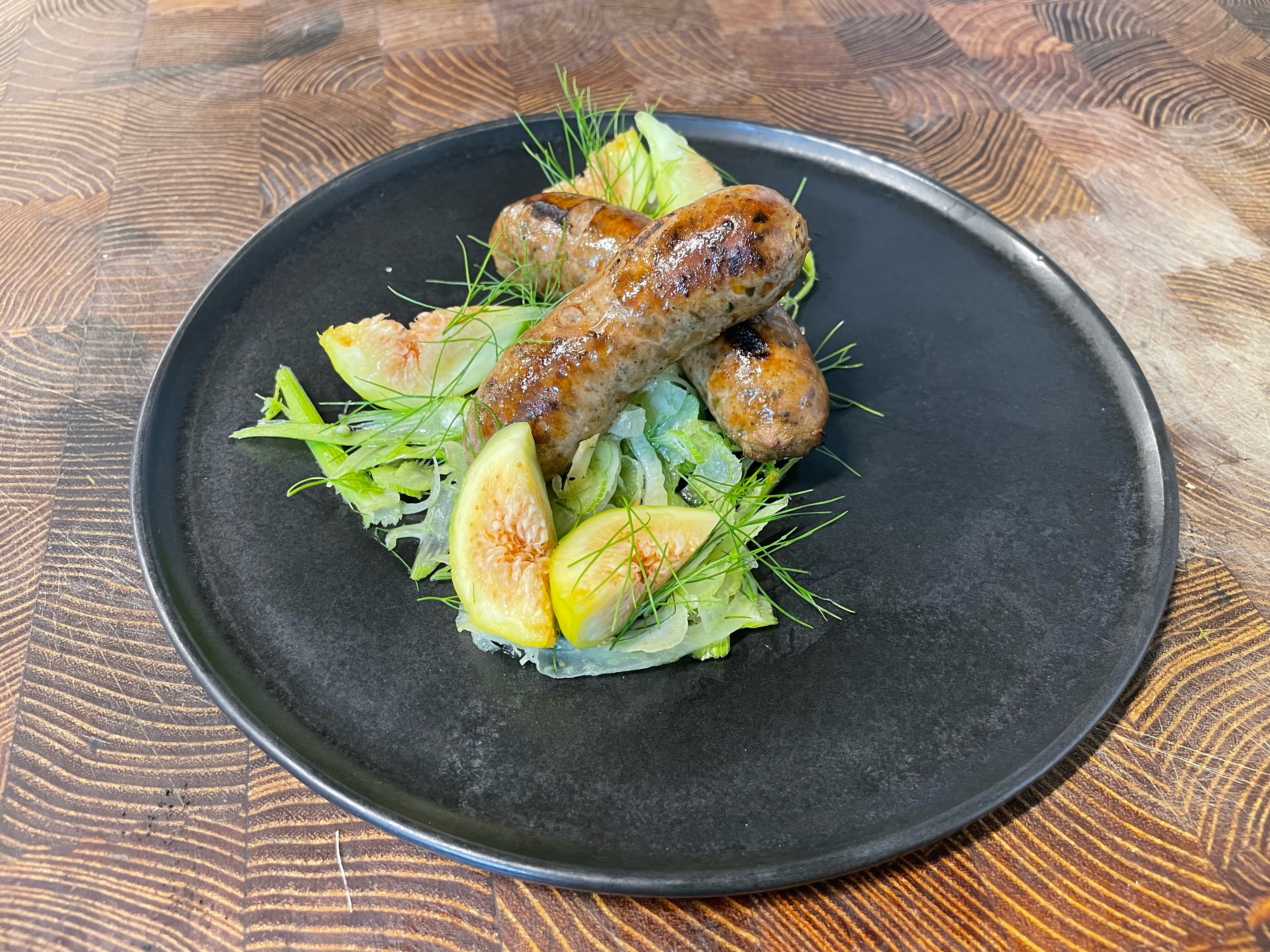
The sausage – making more of its flavour so that people can appreciate it. (Photo: Supplied)
“Good quality, as I say, is that foundation and not losing sight of how things, especially vegetables, should taste. Sometimes you can just lose your heart to a simple potato, an amazing potato with a tender skin, not a perfectly shaped thing at all, and already it has a beautiful scent and you just want to hang onto that.
“I could weep at the way caramelising things destroys the real taste of wonderful food. Gravy is an example. You don’t need that whump of inexplicable stuff. Just deglaze your roasting pan to bring the flavours back, without caramelising them, and trickle them into the very meat that made the beautiful flavour in the first place.”
Daniela also likes to layer the flavours of her cuisine, “making more of it so that people can appreciate it”.
She adds, “Then I want to show you a delicious sausage we make and how I like to use complementary ingredients to bring out the intense flavour. It’s pork with fennel seeds and oregano. Here I’m serving it with figs, only slightly dressed, with fresh fennel to show it off, nicely fresh from the garden and astringent to make the flavour of the simple pork sausage even more powerful.”
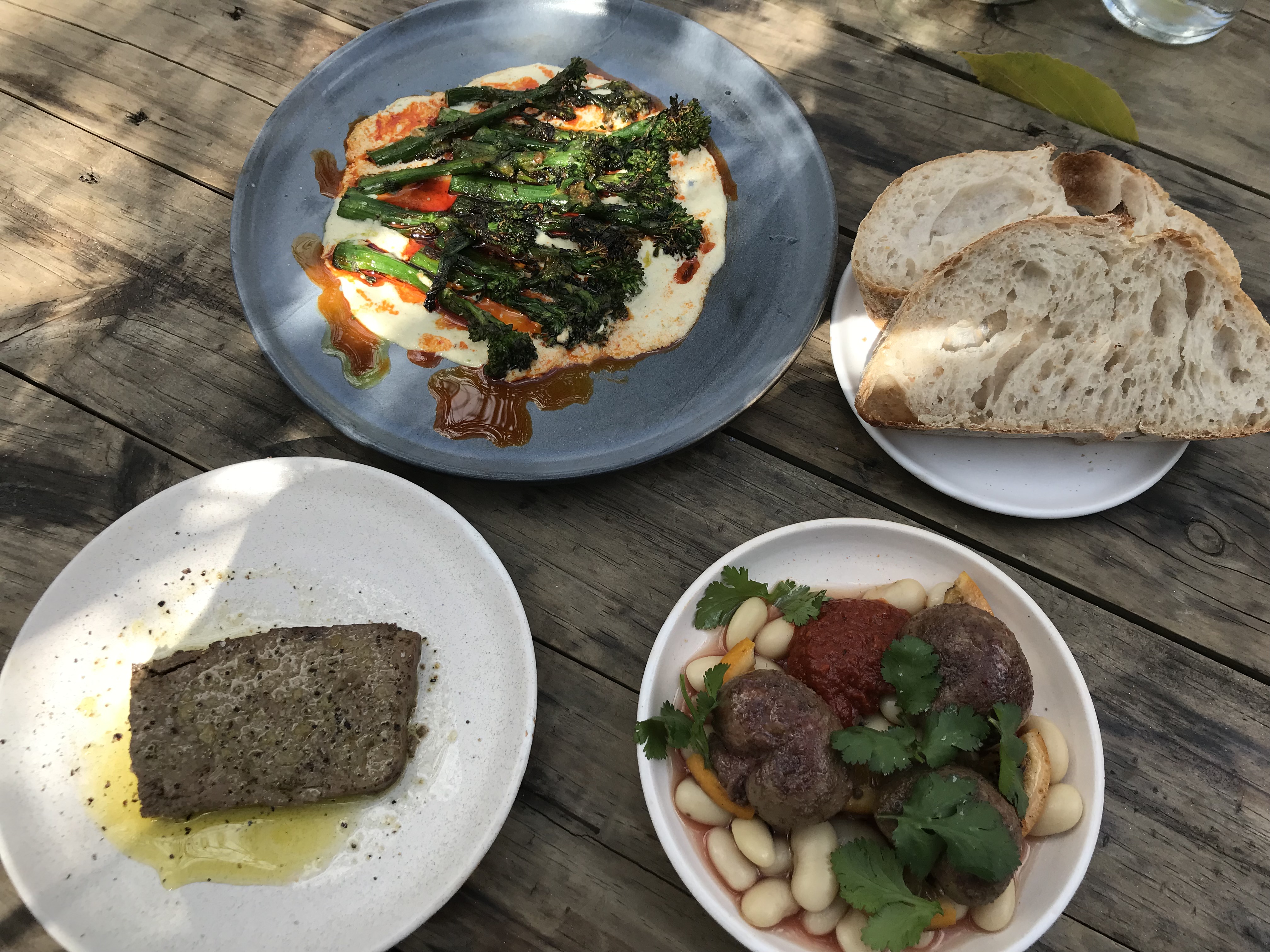
At And then Was Fire, encouraging flavour has become the art. (Photo: Marie-Lais Emond)
And Then There Was Fire — the restaurant in the Cradle of Humankind’s Nirox park — has been an eye-opener to me in the appreciation of simplicity. There, encouraging flavour has become an art. Argentinean Bernardo (Berni) Corti (the che of Uruguayan Faraldo mentioned above), is making simply great flavours with local organic produce, doing everything by hand.
I’ve been following pastry chef Annemieke van Nieuwkerk, who’s now at Father Coffee in Kramerville, another branch being in Rosebank. I first noticed her quite a while ago in her student days at Pretoria University’s great chef school. Then quite a bit later, I caught up with her at Voisin from which she and Jaco Smit have been absorbed into the equally interesting Father Coffee, now with very unusual wines, and including Mieke’s bread and pastries.

‘We’re making some croissants now, buttery and lightly layered as ever but the dough is sourdough.’ (Photo: Supplied)
Mieke says, “Chefs around here in Jozi now seem to be looking back at methods that can recapture the essence of the food they make. It’s about isolating flavours and it is also using those flavours to the utmost. It’s a way that’s developing more and more, to convey the essence of what we can do, for the real pleasure of people who eat our food.
“Especially with pastry, we’re past complications and confusion. That sort of food was very nice for the ‘90s and we had a lot of fun. But now the challenge is to make what you could call the simplest but may actually require more skill to create: the real taste of whatever you’re making.
“For instance, the croissant has been moving further away from its own essence, with all sorts of funny tastes and decorations. We’re making some croissants now, buttery and lightly layered as ever, but the dough is sourdough. If you know how to work with it, it gives the most true, though simple, flavour, making the most of what it really is.”
Michelle Biondi is head chef at Aurum of The Leonardo in Sandown, one of Dineplan’s 10 most booked restaurants. However, it’s an odd place at which to promote major flavour over all the best that money can buy. She does say that people often choose pricy fine dining more for its club aspect, which has little to do with food or flavour but is more about expensive drinks and wanting the music played louder.
Despite that, chef Michelle’s all-consuming goal is to surprise people with such intensity of taste, such unexpected flavour that they’ll want to return for more. She wants her diners to explore greater tastes and be left with lasting flavour impressions. Her flavour notes are key, usually as a planned succession of tastes. She sees flavour that way, rather than singly I think, like music. She knows full well that, “fine dining is often about presentation. I do get that but I’ve sometimes felt during my career that presentation trumps flavour.
“Really good salmon has that beautiful flavour that shouldn’t be over-ridden or swamped. Support is given to it with a fumet that’s a reduction, with cream and white wine. Then a salsa, if you like, of surprisingly fresh peas, exposes the taste rather than fighting it. Then come the orange notes from the vermouth to make the salmon sing.”
James Diack at Il Contadino ays, “We are Jozi through and through. We staked our claim, though our core food offering now is simply Italian. It’s fresh Italian really, grown right here on the farm. We don’t need to import the Italian ingredients. We’ve even got heritage ingredients like artichokes, oregano, boars, figs, tomatoes, no more pak choi but radicchio. We make our own cheese and sausages, pasta. It’s good, honest-tasting cuisine without the tricks and stuff. We don’t require wagyu when we have our well-known, deep, rich, farm-reared boar ragu!”
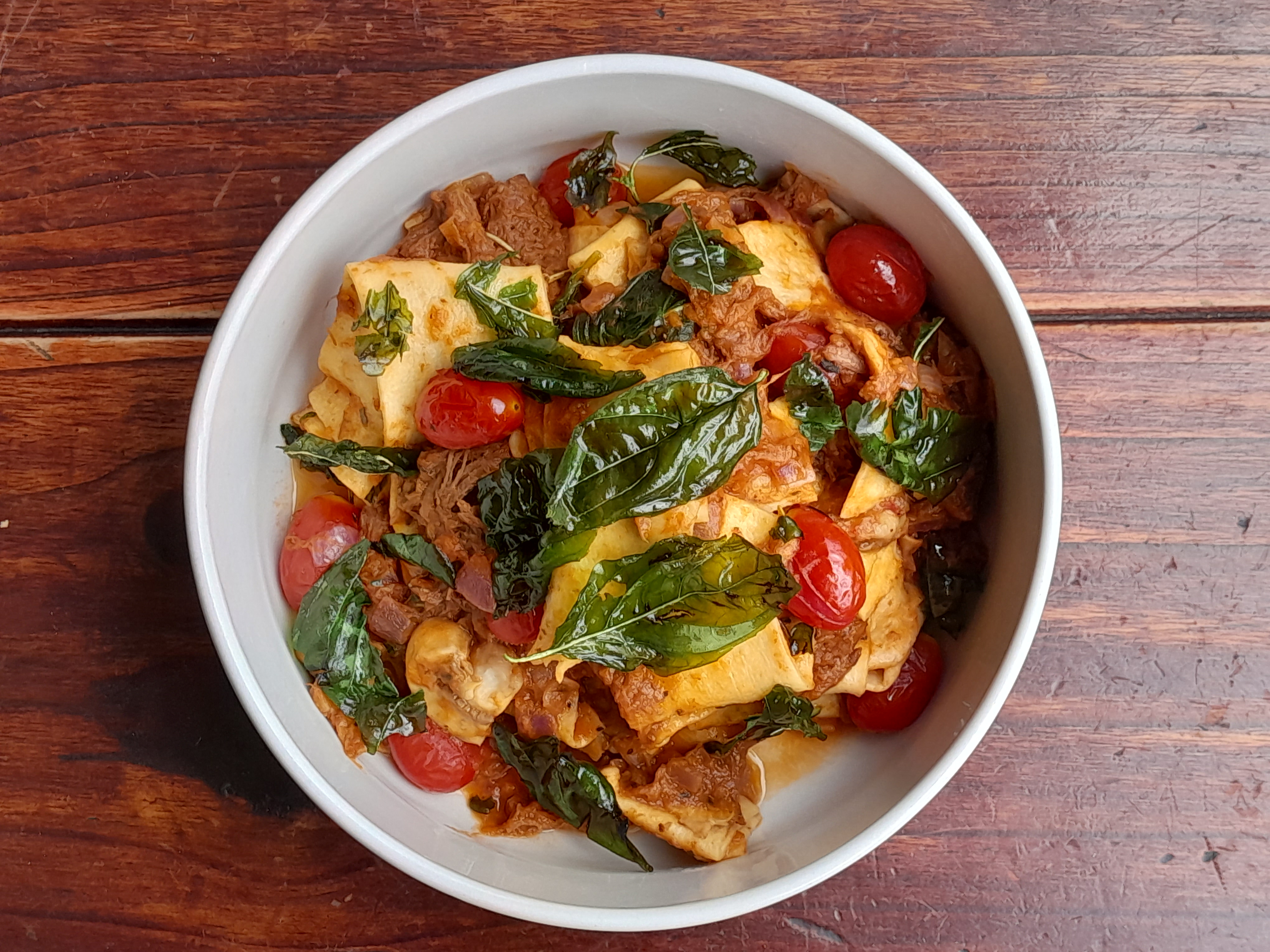
‘We don’t require wagyu when we have our well-known, deep, rich, farm-reared boar ragu!’ (Photo: Supplied)
It’s as though this essence of honest flavour simplicity is somehow imbuing the food creators of our next Joziness phase, without their even having to know each other.
Why Jozi’s chefs do it
I love asking chefs what could be a silly question, about why they are chefs, at the end of any time I spend with them. The thing is, I never get a silly answer. I’m often surprised, even just, “I want people to be happy and enjoy my food.”
I ask it of chef Wandile Mabaso (see main image of his sole dish), currently holding the title of Best Chef in South Africa at the latest Luxe food awards in 2022. He’s just been revisiting the places and people of his previous Ducasse time in Paris, before his own Les Creatifs.
He says, “I see my duty as a chef as a kind of interpreter between nature and human beings — I like to explore what nature provides and then transform it into something nutritious that evokes emotions.” He pauses and smiles, “I also like to educate eaters just a little!”
I ask chef Candice Philip, probably our best woman chef in South Africa, most recently of Basalt and rumoured to be opening her own place again.
“I love the artistry and alchemy of it. I want to give joy to people that they wouldn’t expect, so I love that creative process and dreaming up flavours and ideas. For me, I think it’s also that art of pulling together simplicity and sophistication, just in a modern and a beautiful way.”
Multi-awarded chef David Higgs recently expostulated, when I asked him about possibly moving further from the kitchen within the Marble Group, of which another restaurant will open in Cape Town too: “But I love cooking!
Later, when I ask him why and what, he replies there are such different types of cooking for many different expectations. “So what’s really nice for me is cooking with someone or mates. That’s pretty much a highlight.”
One of the most talented and usefully-travelled Jozi cooks I can think of is Jared Melamed, who’s shut Sotto Sopra to start a new place Hyde Park with pastry chef Lauren van Tonder of Linden’s Oregano.
“Feeding people is what I love. Cooking’s a skill most people have but feeding people is an art. I love creating art and I’m no painter so I create food and flavour amalgamations. I think they go hand In hand.”
The place will be the Pasta Social Club. “The food will be sophisticated but affordable, focusing on three Ps: pizza, pasta and pastry. Yes, if more restaurants were affordable and had sophisticated menus, more people in SA would be better educated about good food.”
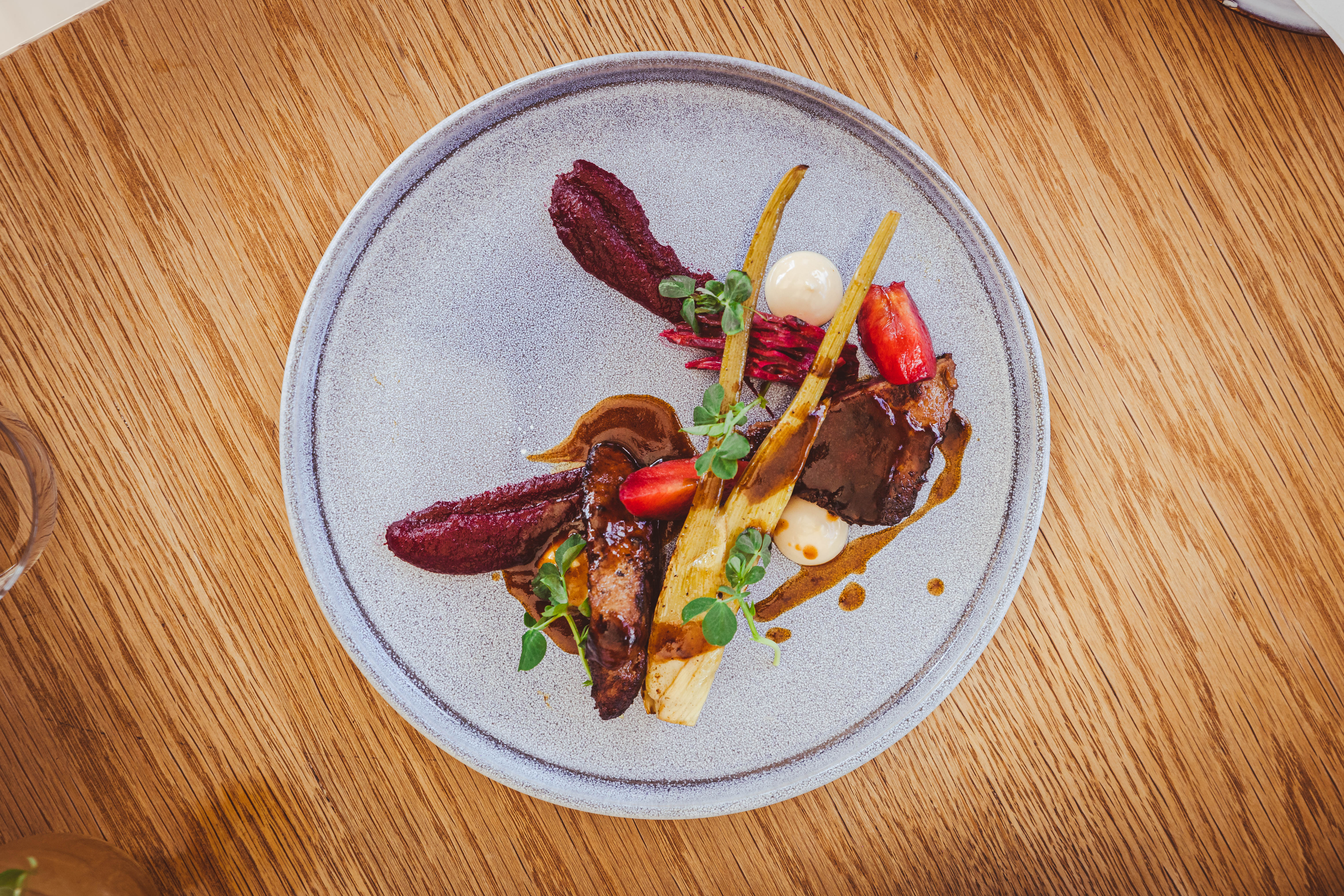
Embarc’s O’Donovan likes to feature the spirit of Jozi in his food, like this ostrich dish of ‘lean glamour’. (Photo: Supplied)
True and top chef Darren O’Donovan is the self-effacing sort and I wonder if he misses out on some awards because of that. His restaurant Embarc is surprisingly small and surprisingly casual given its upper-rung food.
“I love hosting people around a table involving food, wine, travels and a story to tell. Like a dining-room table, where people of all walks of life, ages, religions, cultural beliefs and so on get together for the same things — for nourishment and enjoyment. I’m so fortunate and privileged to be part of this coming together and creation of memories.”
Chef Darren epitomises ‘Joziness’ in many ways and especially likes to feature its spirit in his food. DM/TGIFood
The writer supports Nosh Food Rescue, an NGO that helps Jozi feeding schemes with food ‘rescued’ from the food chain. Please support them here.






 Become an Insider
Become an Insider
Great article, Marie-Lais – what wonderful places we have here in Jozi! And what talented and innovative chefs. Thank you for bringing them together.